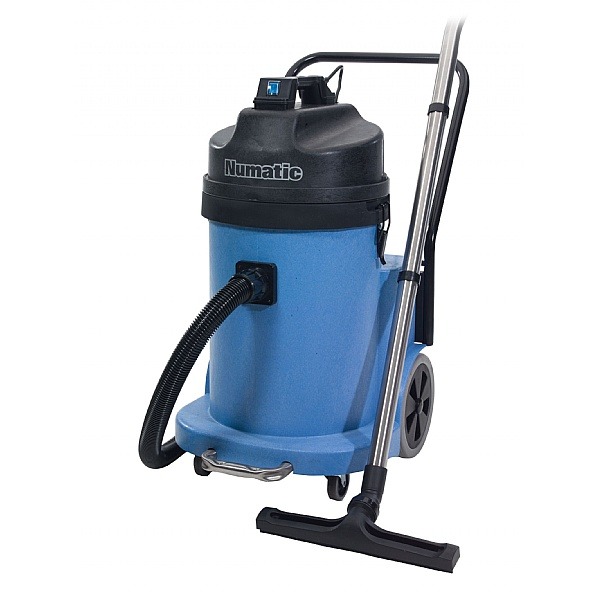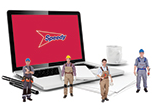
Why your business needs an industrial vacuum cleaner
An industrial vacuum cleaner can remove everyday dust and dander as well as debris, industrial waste, construction waste, and larger pieces of waste.
Whether you're a professional cleaning service or have to clean up plaster and sawdust after electrical or joiner work, an industrial vacuum cleaner is designed to be powerful enough to pick up larger chunks of material and waste compared to ordinary household cleaners.
HIRE VACUUM CLEANERS FROM SPEEDY
If you're a professional, having an industrial vacuum cleaner could be a real asset to your kit. Quicker, more thorough cleanups make the customer happier and result in a safer environment.
Depending on the job, you may only require an industrial vacuum for the last day of work. Therefore, it makes sense to hire one so you don't have to transport and store it when not in use.
If you're a DIYer, you will likely need one after every job. This could only be every few months, so again, hiring is logical.
At Speedy Hire, we have a range of industrial vacuums available to hire, depending on your cleanup task. Whether you require a wet & dry vacuum, something for dust extraction, or something lightweight for simple clean-ups, we have an option for all needs.
We also have PPE available to purchase, including dust masks and eye protection, which will be essential when carrying out the work and cleaning.
Industrial vs Domestic vacuum cleaners
Domestic vacuum cleaners are designed to be used in everyday household settings. They can banish dust, pet dander, and small particles of dirt – general cleaning in a home.
On the other hand, industrial vacuum cleaners have much more power. The suction is stronger and designed to deal with more solid waste, such as small chunks of plaster, sawdust, and other debris left behind by building and renovation works.
Industrial vacuum cleaners can also be used in warehouses, production lines, and assembly lines to keep on top of dropped debris and dust, improving the area's hygiene, and reducing the risk of accidents.
They offer a more thorough clean versus domestic vacuums, so they are great for areas where contamination risk needs to be controlled, such as food production or hospitals.
Basically, all professional settings can benefit from their power and adaptability.
What other benefits come from industrial vacuum cleaners?
Industrial cleaners aren't just more powerful. They can also be quieter to run and come with benefits that ensure your customer's home or environment is left clean and sanitary as before the job began.
While it is not officially the responsibility of a tradesperson or builder to clear up any mess made by the work they have carried out, especially if it is in a residential environment, it is a good idea to do so to leave a good impression.
If you've got waste plaster, sawdust, or fibres, it can be a messy and potentially hazardous job with debris and dust, which regular household vacuums and cleaning products can't handle.
Always remember to wear PPE when clearing up debris.
How to choose your Industrial Vacuum cleaner
- Identify the material to be vacuumed
Are you an electrician who needs to regularly chase walls to install new wiring? In manufacturing, and have a lot of debris on the floor which needs regular attention? Whatever your issue, choose the correct vacuum for your needs.
Plasterers or electricians will need an industrial vacuum to pick up large chunks of old plaster. There's also dust and other debris to capture, which must be held secure, so it doesn't become airborne again. The nozzle may also have to be quite large to get this material.
You will need a wet and dry vacuum if your work involves liquid, such as plumbing.
- Assess the size of the work area
The size of the area needing to be cleaned and the material and bulk of the material will determine how big the suction capacity is. You don't want to have to constantly stop and start to empty your vacuum, especially if you have multiple jobs in a day and need to stick to timeframes.
Likewise, messier jobs will need a larger capacity, too, as there will be more waste.
- Think about your day-to-day
Do you do multiple jobs per day? You want to find a balance between having a machine that can hold the waste of all these jobs so you can safely dispose of it but isn't too bulky and heavy to transport and take into homes.
- Check the filters
If you work with dust and small particles, you need a vacuum with a powerful motor and a suitable filter.
The presence of HEPA (High Efficiency Particulate Air) or ULPA (Ultra Low Penetration Air) filters is beneficial, especially if you have customers. You want to ensure they have a clean, sanitary home when you're finished.
- 2024
- 2023
- December 2023 (13)
- November 2023 (9)
- October 2023 (7)
- September 2023 (10)
- August 2023 (20)
- July 2023 (21)
- June 2023 (17)
- May 2023 (17)
- April 2023 (17)
- March 2023 (14)
- February 2023 (15)
- January 2023 (7)
- 2022
- December 2022 (6)
- November 2022 (12)
- October 2022 (24)
- September 2022 (14)
- August 2022 (12)
- July 2022 (15)
- June 2022 (18)
- May 2022 (14)
- April 2022 (9)
- March 2022 (5)
- February 2022 (5)
- January 2022 (2)
- 2021
- December 2021 (7)
- November 2021 (10)
- October 2021 (1)
- September 2021 (1)
- August 2021 (3)
- July 2021 (3)
- June 2021 (4)
- May 2021 (1)
- April 2021 (1)
- March 2021 (2)
- February 2021 (1)
- January 2021 (1)
- 2020
- 2019
- 2017
- 2016
- 2014
- 2013
- 2012
- 2011


